INTERNACIONAL
Elections watchdog urges Senate GOP to close noncitizen voting loophole
FIRST ON FOX: As the Senate reconvenes this week after a spring break, the Honest Elections Project is urging GOP leaders to move quickly to close a loophole they say is allowing noncitizens to vote in federal elections.
According to Honest Elections Project, an election integrity watchdog group, judicial interpretation of the National Voter Registration Act, often called the Motor Voter Act, effectively ties states’ hands, making it difficult to put commonsense voter ID requirements in place and opening the window for noncitizens to influence and tip the balance in elections.
The group said current federal law makes it so that voter registration essentially operates on an honor system in which all a noncitizen needs to do to be added to the voter rolls is check a box indicating he or she is a citizen. Doing so is punishable as perjury but is not sufficient as a deterrent, critics say.
To stop this, Honest Elections sent a letter to Senate Majority Leader John Thune, R-S.D., and Senate Rules Committee Chair Mitch McConnell, R-Ky., on Monday, urging them to immediately bring the SAVE Act to the Senate floor for a vote.
SENATOR JOINS GROUP OF FAR-LEFT LAWMAKERS WHO THINK TRUMP HAS – AGAIN – COMMITTED IMPEACHABLE OFFENSES
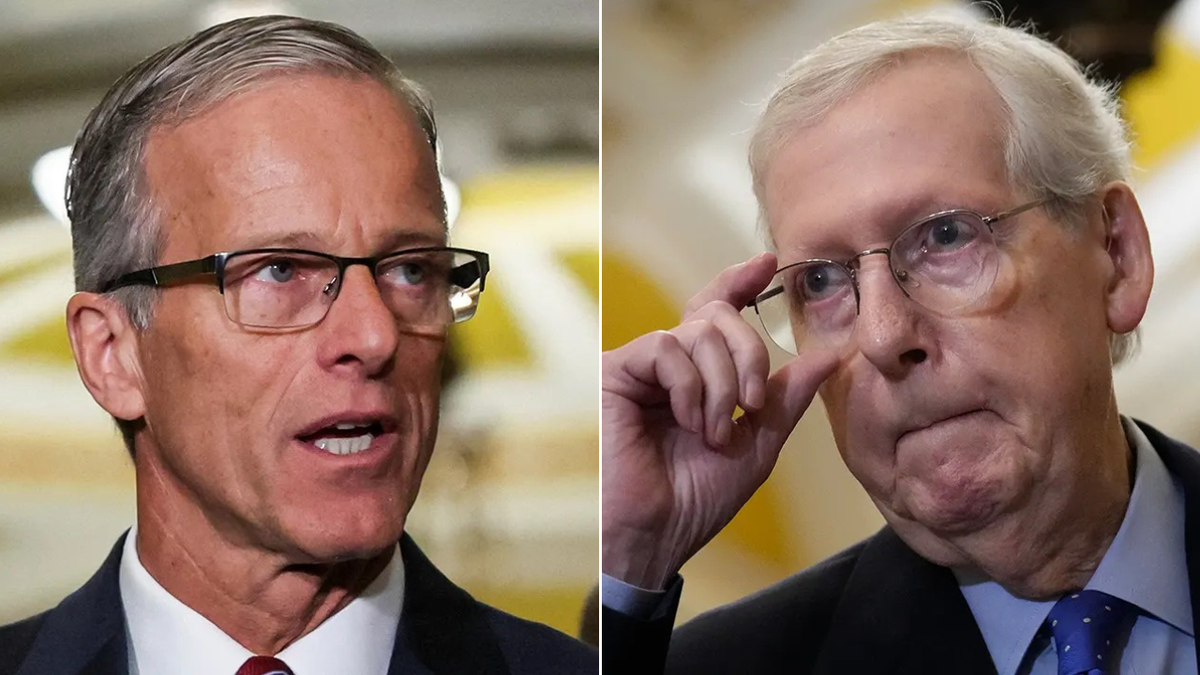
The Honest Elections Project urged Sens. John Thune, R-S.D., left, and Mitch McConnell, R-Ky., to act to protect federal elections from ineligible noncitizen voters. (Getty Images)
The SAVE Act, which passed the House this month, would require voters to show proof of citizenship, such as a birth certificate, passport, naturalization certificate or REAL ID that notes citizenship status. According to Congress.gov, the Senate received the legislation for consideration from the House on April 10.
When the House was considering the bill, House Speaker Mike Johnson, R-La., said, «This will be one of the most important votes that members of this chamber will ever take in their entire careers.»
Johnson urged House members to vote in favor of the bill, posing the question: «Should Americans and Americans alone determine the outcome of American elections? Or should we allow foreigners and illegal aliens to decide who sits in the White House and in the people’s House and in the Senate?»
Critics of the bill, largely Democrats, argue that it would make voter registration more difficult by adding new documentation requirements and red tape to register. Opponents have argued that people in rural areas, as well as elderly people who have trouble accessing ID offices, would find it difficult to register to vote, effectively disenfranchising them.
AS REAL ID ROLLOUT APPROACHES, CONGRESSIONAL PRIVACY HAWKS LARGELY SILENT ON CONCERNS
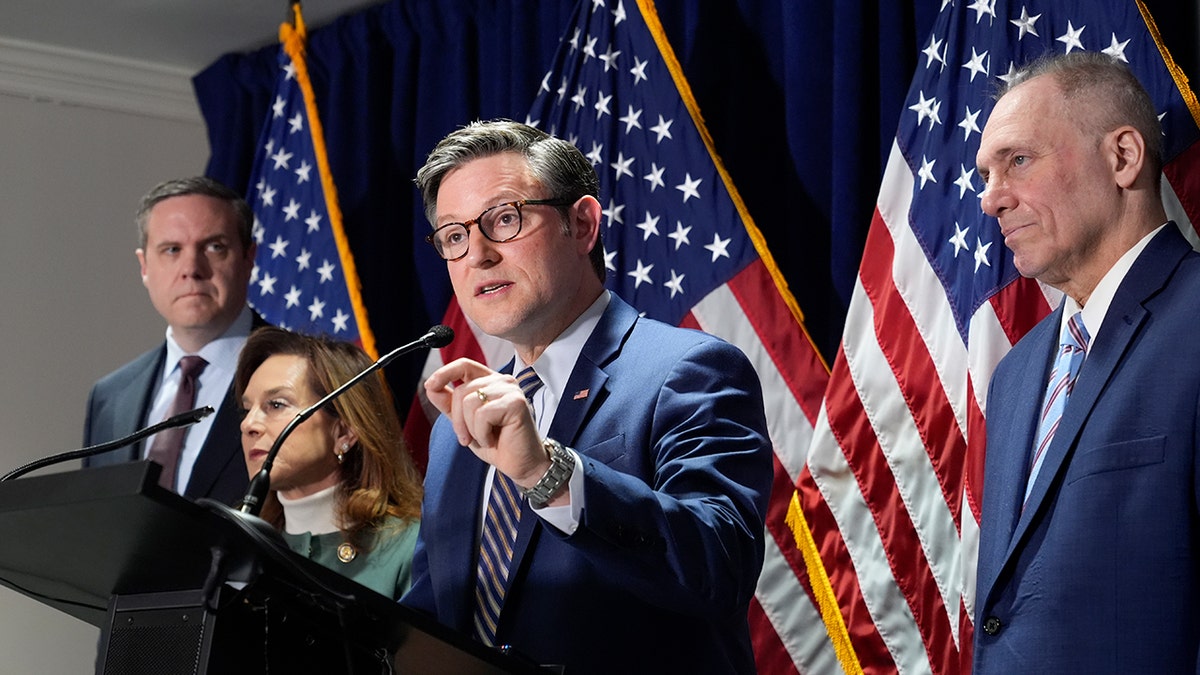
House Speaker Mike Johnson, R-La. (J. Scott Applewhite/AP)
Opponents have also said that recently married women who have had a name change would be disenfranchised because their identification would be outdated.
The House passed the measure in a 220-208 vote, with just four Democrats joining Republicans to vote in favor.
Honest Elections Executive Director Jason Snead argued in the letter that adding the proof of citizenship requirement to voter registration would make it «easy to vote, but hard to cheat.»
Snead slammed opponents of the SAVE Act, saying they «rely on a familiar litany of debunked and misleading arguments» that «have been made about voter ID laws for decades but were never borne out.»
HOUSE REPUBLICAN ENTERS RACE FOR MITCH MCCONNELL’S SENATE SEAT, SETTING UP HIGH-STAKES GOP PRIMARY
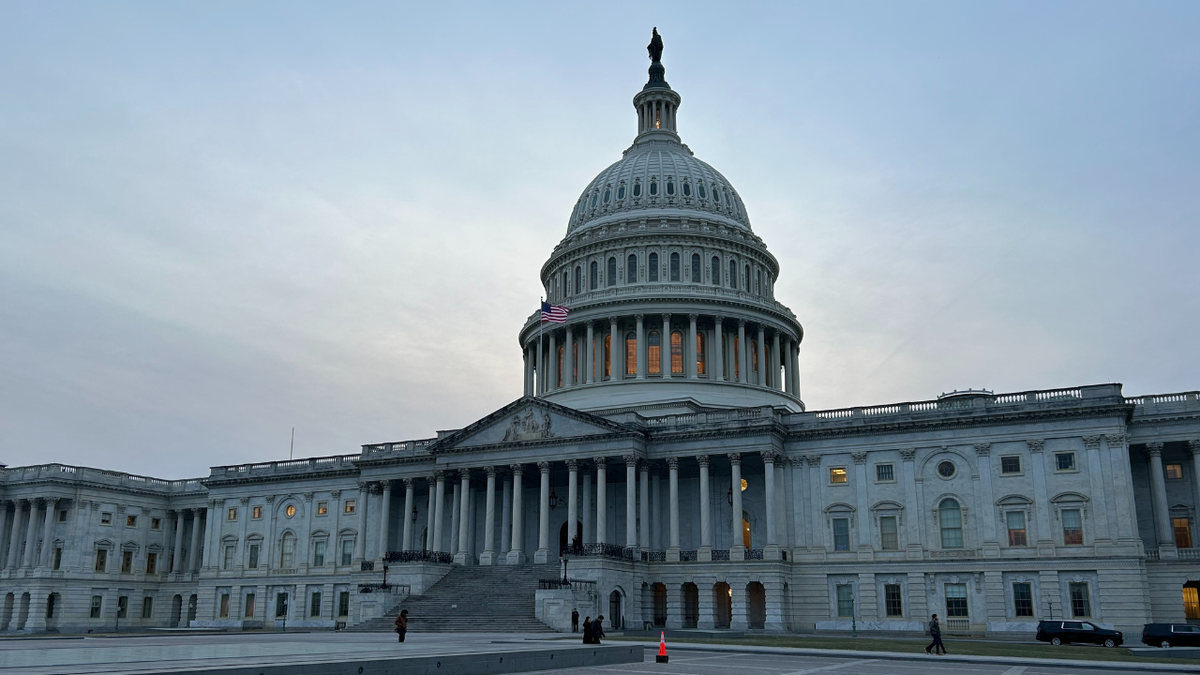
U.S. Capitol (Fox News Digital)
He explained that the SAVE Act has safeguards in place that would require states to establish a process to resolve identification discrepancies, such as a married woman’s new name, allowing them to show additional documentation, such as a marriage license.
Snead said that «by the same token, alternative evidence of citizenship could be offered by any American who may lack common records.»
On the other hand, Snead said «the evidence clearly shows that noncitizens are able to register and vote» under current law.
«In 2018, the Department of Justice charged 19 noncitizens with illegally registering and voting,» he said.
HOUSE DEM JUMPS INTO CROWDED MICHIGAN SENATE RACE
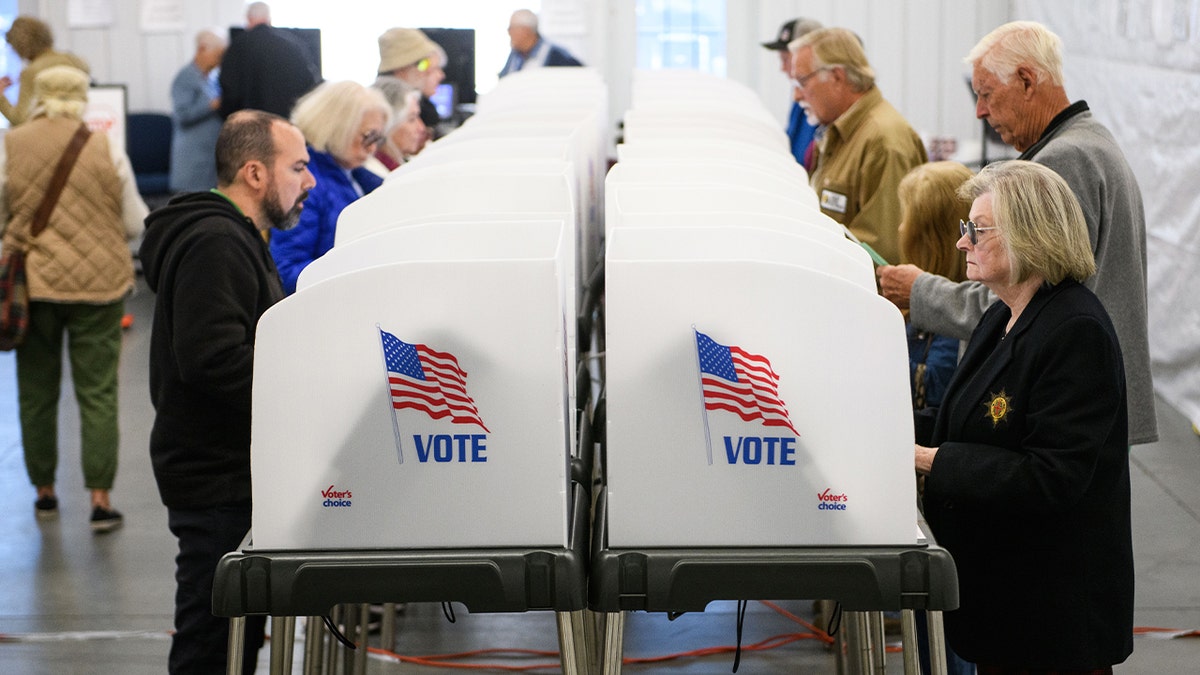
(Melissa Sue Gerrits/Getty Images)
Snead also cited Michigan Secretary of State Jocelyn Benson recently announcing that 15 noncitizens voted in 2024 and officials in Ohio, Texas and Virginia recently identifying «significant numbers of noncitizens on their voter rolls and reported that many appear to have voted in recent years.»
«Many races are decided by razor-thin margins – sometimes by a single vote. Each illegal vote cancels out the voice of a lawful citizen voter,» said Snead.
CLICK HERE TO GET THE FOX NEWS APP
In a statement sent to Fox News Digital, Snead said proof of citizenship for voter registration is widely popular among most Americans. He cited a recent Gallup survey that found that 83% of Americans support having to show proof of citizenship when registering to vote in federal elections.
«As the Senate returns to session, I urge Leader Thune to take up the SAVE Act without delay,» Snead said. «We urge Leader Thune to take this opportunity to allow every Senator to go on the record supporting the fundamental principle that only citizens should vote in American elections.»
Fox News Digital has requested comment from the offices of both Thune and McConnell.
Republicans,Voting,Immigration,Senate,Elections,Law
INTERNACIONAL
Anti-ICE attackers revealed to have extensive history of radical protest activities
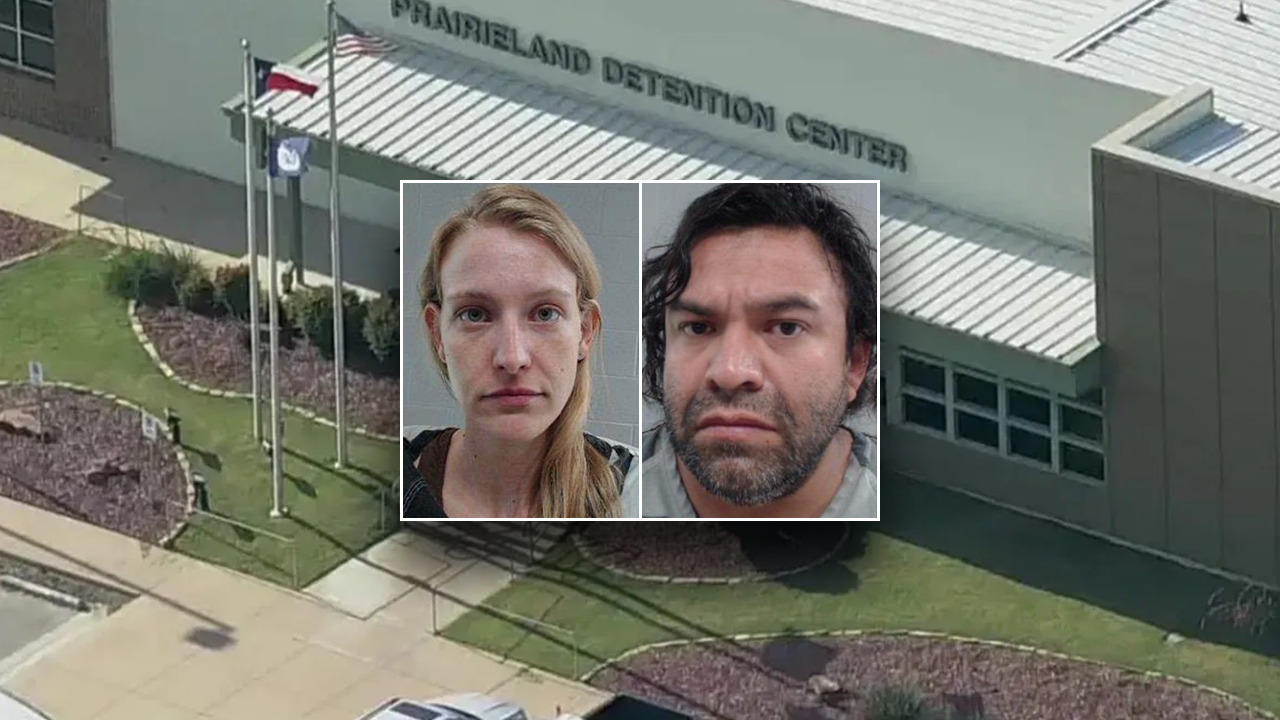
NEWYou can now listen to Fox News articles!
Some members of the group charged in the Prairieland Detention Center anti-ICE attack on Independence Day have been arrested in the past for protest activities.
Ines Soto, who is part of the group of ten charged with attempted murder of federal officers and firearm offenses, was arrested at a protest in 2016 for allegedly resisting arrest and trying to avoid detention, according to K-HOU 11 at the time.
The protest was against a speech by Richard Spencer at Texas A&M University. The outlet My Aggie Nation noted that Soto was 31 in 2016, which corroborates with a KERA News report stating that Soto is now 40 years old and was released on a $10,000 bond.
FBI CAPTURES FORMER MARINE CORPS RESERVIST ACCUSED OF SHOOTING AT ICE OFFICERS AT TEXAS DETENTION CENTER
Ten suspects were charged with attempted murder of a federal officer in connection with the July 4, 2025, ambush attack on the Prairieland Detention Center in Alvarado, Texas. (Johnson County Sheriff’s Office)
Meanwhile, KERA News reported that Savanna Batten partook in the Occupy Wall Street movement through an «Occupy Dallas» protest in 2011, where she was arrested for allegedly not allowing people to come and go from a Chase Bank. The case was ultimately dismissed, as a criminal trespassing charge was scrapped in exchange for 24 community service hours, the outlet reported.
Batten also specifically has a history of anti-ICE activism, as she was charged for allegedly blocking a highway in June 2018 near a Dallas ICE facility, and the charge for that was also dismissed in 2019 as part of a program.
Fox News Digital reported last week that Benjamin Song, who was captured by the FBI last week, had a known protest background. He was named in a 2023 lawsuit over a counter-protest to the New Columbia Movement at a drag brunch in Fort Worth, Texas. The lawsuit noted Song was tied with a pro-arms leftist group, the Elm Fork John Brown Gun Club.
UNEARTHED SOCIAL MEDIA POSTS EXPOSE RADICAL VIEWS OF ANTI-ICE SHOOTING SUSPECT CAPTURED BY FBI

During the Prairieland Detention Center attack, cars were vandalized with anti-ICE messages such as «Ice Pig.» (Justice Department)
In addition, he was also arrested in 2020 during a protest in Austin for allegedly assaulting a public servant, according to Fox 4.
Song’s social media profiles also indicated that he was extremely vocal online about his stances and activism, and also appeared to use a martial arts studio tied to his mother to film tactical exercises.
CLICK HERE FOR MORE IMMIGRATION COVERAGE
«Do you want to end mass shootings? Abolish the police,» he posted in June 2022 under the X handle, BubbleBreakBS.
Song, a former U.S. Marine Corps reservist, is accused of firing two AR-15-style rifles at two correctional officers and one Alvarado police officer, according to a criminal complaint obtained by Fox News Digital.
MORE DETAILS REVEALED ON SUSPECTS IN INDEPENDENCE DAY ICE ATTACK IN TEXAS
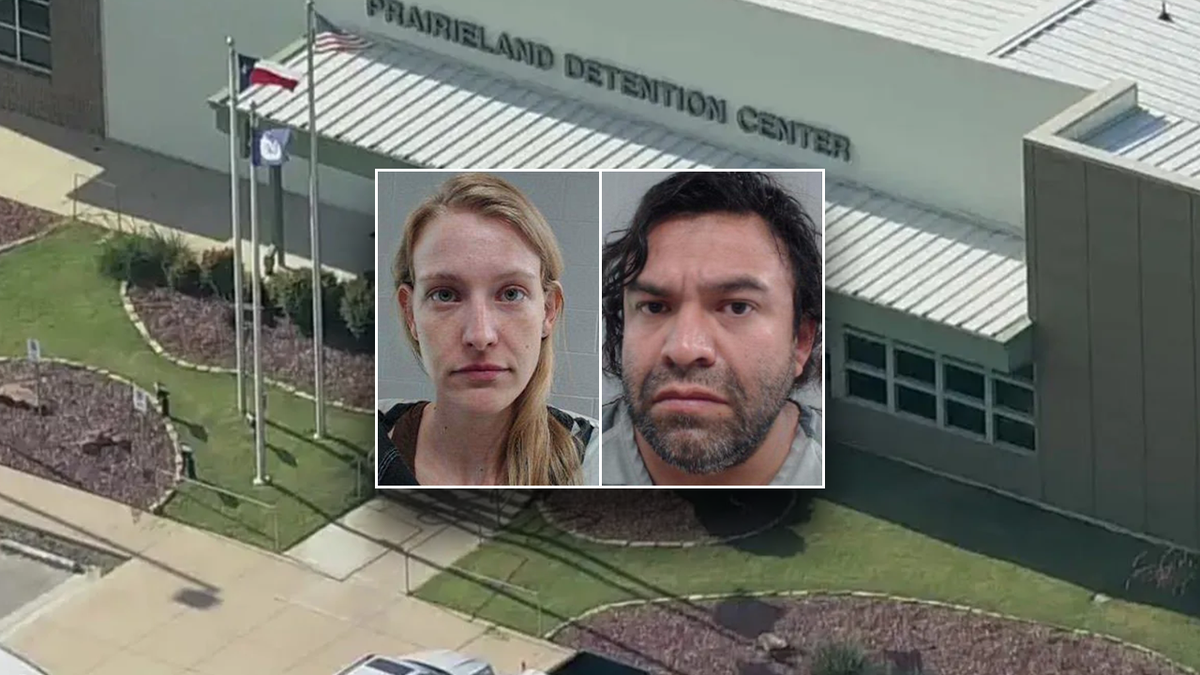
Savanna Batten (left) and Ines Soto (right) are both charged with attempted murder and firearms offenses in an anti-ICE Texas attack on July 4, 2025. (Johnson County Jail/)
«Make no mistake, this was not a peaceful protest,» Acting U.S. Attorney Nancy E. Larson said in a July 8 statement. «This was an ambush on federal and local law enforcement officers. This increasing trend of violence against law enforcement will not be tolerated in the Northern District of Texas. Those who use violence against law enforcement officers will be found and prosecuted using the toughest criminal statutes and penalties available.»
CLICK HERE TO GET THE FOX NEWS APP
A local police officer was shot in the neck by a suspect in the woods, according to the complaint. Another assailant allegedly fired dozens of rounds at unarmed correctional officers who had stepped outside the facility. Cars outside the facility were vandalized with «Ice pig» and «Traitor,» as authorities obtained anti-government literature from those involved, as well as a flag that said «Fight Fascism, Fight Oligarchy.»
Fox News Digital’s Greg Wehner and Stephen Sorace contributed to this report.
INTERNACIONAL
De “Hey Jude” a “Hotel California”: 40 letras de canciones que hicieron historia
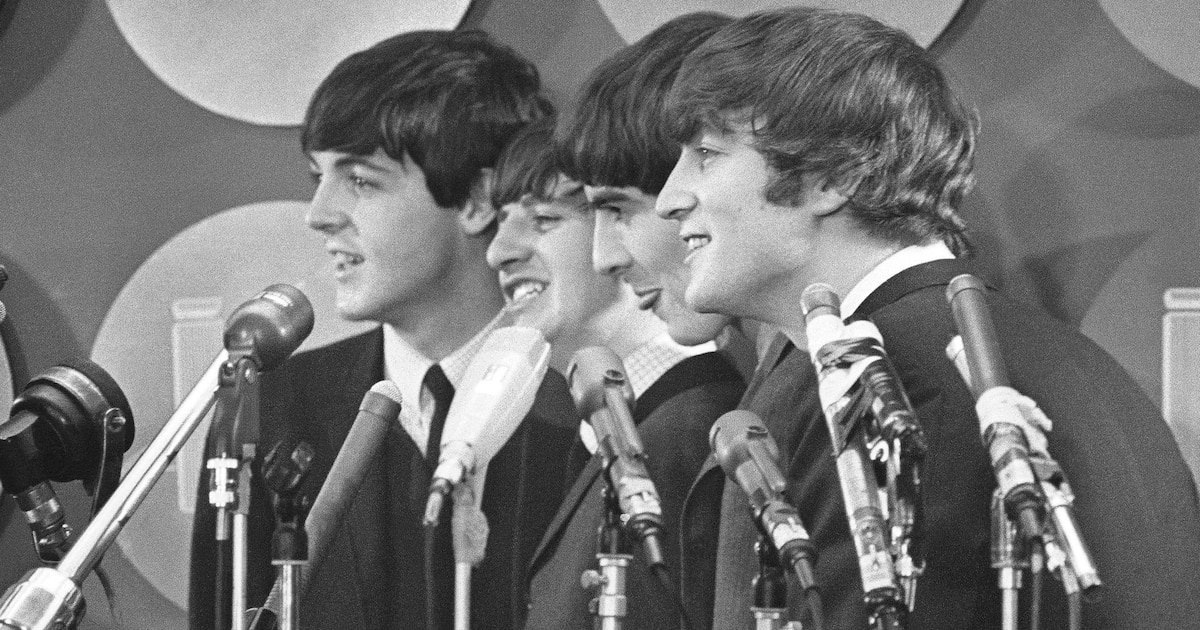
Hay canciones que pasan a la historia, ya sea por su melodía, por las voces que las interpretan o sus letras. The Independent realizó un ranking de las 40 mejores letras de canciones en inglés de todos los tiempos. Bandas como Nirvana, The Beatles o Abba forman parte del listado. Según el ranking, las canciones se destacaron no solo por su música o interpretación, sino también por la fuerza de sus palabras, capaces de dejar una huella en distintas generaciones.
La lista está encabezada por ‘All Apologies’ de Nirvana. El tema está incluido en el álbum In Utero de 1993. Cobain escribió esta canción dirigiéndose tanto a Courtney Love como a su hija, Frances Bean. Para muchos, este track logra transmitir con especial nitidez el malestar interno y la rabia del músico, a la vez que se entrelaza con una profunda declaración de amor hacia su familia.
Según The Independent, el mensaje contenido en esta canción supera la tragedia personal de Cobain y subraya la permanencia del afecto más allá de la ausencia física. Apenas seis meses después del lanzamiento, el artista se quitó la vida y dejó atrás de sí un tema que muchos consideran imprescindible para comprender el significado de su legado artístico.
El listado continúa con Nine Inch Nails, ‘Hurt’. El tema, escrito e interpretado por Trent Reznor, hace un retrato directo de la autodestrucción y el sufrimiento, elementos presentes desde la primera grabación. Si bien Reznor nunca precisó si el trasfondo hace referencia al consumo de heroína, el texto y la atmósfera de la canción transmiten una carga emotiva que oscila entre el dolor y una poesía sombría.
Joy Division con su hit ‘Love Will Tear Us Apart’ da continuidad al ranking. “¿Por qué el dormitorio está tan frío volteado de tu lado?, ¿Mi sincronización es tan imperfecta, nuestro respeto se ha agotado?“, cita la letra. El sencillo, escrito por Ian Curtis, refleja matices de su propia experiencia personal, marcada por la crisis matrimonial y una inminente tragedia.
La canción sobresale por una combinación de melodía vibrante y una lírica de gran vulnerabilidad. La composición no transmite un mensaje sombrío en sí mismo, sino que transforma su tristeza en una pieza conmovedora, donde la humanidad del autor adquiere toda su dimensión.
Arcade Fire, ‘Sprawl II Mountains Beyond Mountains’ continúa la lista. Junto a la voz de Régine Chassagne, la canción aporta una atmósfera única. La melodía logra materializar emociones latentes y anhelos de escapar de la uniformidad.
El ranking, presentado por The Independent, sigue con Beyoncé, ‘Formation’; Laura Marling, ‘Ghosts’; LCD Soundsystem, ‘Losing My Edge’; Leonard Cohen, ‘So Long, Marianne’; The Libertines, ‘Can’t Stand Me Now’; Kate Bush, ‘Cloudbusting’; Nick Cave, ‘Into My Arms’; The Sisters of Mercy, ‘This Corrosion’ y Sultans of Ping FC con ‘Where’s Me Jumper?’
Seguidamente, el medio español posicionó entre los mejores temas a ‘There Is a Light That Never Goes Out’, de The Smiths; ‘I’m On Fire’ de Bruce Springsteen; ‘Father Lucifer’ de Tori Amos; ‘Black Steel in the Hour of Chaos’ de Public Enemy y ‘Pools (Drank)’ de Kendrick Lamar.
Mientras la comunidad afroamericana afrontaba las consecuencias de políticas conservadoras, Prince decidió abordar en su tema principal cuestiones como la violencia asociada a las pandillas, la pandemia del sida, tensiones políticas y catástrofes naturales. Con este enfoque, el cantante dejó atrás su aislamiento creativo y presentó ‘Sign O ‘The Times’, una canción donde la reflexión social y el comentario sobre realidades urgentes pasaron a primer plano.
En el listado no podían faltar los Rolling Stones. Si bien tienen grandes letras, en ‘Gimme Shelter’ recrean la atmósfera de inestabilidad y amenaza constante de la época. La composición captura el miedo y la incertidumbre de una sociedad al borde de la ruptura. Asimismo consolida el legado de Mick Jagger, Keith Richards y sus compañeros como cronistas musicales de un periodo turbulento.
Si de turbulencias se trata, David Bowie es uno de los artistas que, durante su vida, atravesó momentos turbulentos. Estos periodos fueron de gran inspiración para el músico a la hora de componer. ‘Station to Station’ es una de las canciones grabadas en los días más oscuros de Bowie. El músico lidiaba con su adicción a las drogas en Los Ángeles mientras buscaba refugio en las letras.
El ranking continúa con ‘Supersonic’, de Oasis; ‘Born Slippy’ de Underworld; ‘Landslide’ de Fleetwood Mac; ‘Graceland’ de Paul Simon; ‘Take a Walk on the Wild Side’ de Lou Reed; ‘Every Time the Sun Comes Up’, de Sharon Van Etten; ‘Gloria’ de Patti Smith; y ‘Hotel California’ de Eagles.

Thin Lizzy sigue el listado con ‘The Boys are Back in Town’. Le sigue Nina Simone con ‘Four Women’; St. Vincent ‘Digital Witnesses’; Frank Ocean con ‘Pink + White’. El ranking continúa con ‘Dinner at Eight’ de Rufus Wainwright; ‘It’s Alright Ma’’ de Bob Dylan; ‘The Winner Takes it All’ de Abba y ‘I Wanna Be Adored’ de The Stone Roses.
En los tres últimos puestos se encuentran ‘The World is Yours’ de Nas; ‘When I’m Sixty Four’ de The Beatles y Beck con ‘Loser’. Este último es uno de los éxitos más recordados de Beck. Surgió a partir de una autocrítica espontánea después de escuchar una versión preliminar del tema. El propio músico reconoció sentirse «el peor rapero del mundo» y se definió como “un perdedor”.
Esta percepción no solo alimentó el concepto de la canción, sino que inspiró el famoso estribillo que acabó identificando al tema. A pesar de la aparente falta de coherencia en la letra, la composición logra crear una atmósfera singular gracias a su escritura en flujo de conciencia, un recurso que genera magnetismo incluso en lo absurdo.
INTERNACIONAL
House Republicans warn anti-ICE rhetoric from Democrats is driving violent attacks on agents

NEWYou can now listen to Fox News articles!
President Donald Trump’s crackdown on illegal immigration and deportation rollout has ignited anti-Immigration and Customs Enforcement (ICE) protests across the United States.
House Republicans told Fox News Digital there is a parallel between Democrats’ rhetoric against federal immigration officers amid this crackdown and the surge in violence against ICE and Border Protection (CBP) officers.
«The increasingly violent attacks against law enforcement are being egged on by irresponsible Democratic politicians,» Rep. Tom McClintock, R-Calif., said in an exclusive interview.
Department of Homeland Security (DHS) Secretary Kristi Noem on Monday blamed Democrats’ «sanctuary city policies» for the shooting of an off-duty CBP officer in New York City.
NOEM WARNS OF ‘UNPRECEDENTED’ THREAT LEVEL FOR ICE AGENTS, BLAMES ‘LIES’ FROM DEMOCRATS
A split image of demonstrators in New York City protesting the Trump administration’s use of the Alien Enemies Act to more quickly deport certain migrants from the U.S. to El Salvador, alongside a photo of U.S. President Donald Trump at the White House in 2025. (Getty Images)
A second illegal immigrant has been apprehended in connection to the shooting of the CBP officer. He was reportedly struck in the face and forearm in Manhattan’s Riverside Park on Saturday night. Miguel Francisco Mora Nunez, a Dominican national who was caught by Border Patrol in April 2023, was taken into custody following the shooting.
GUNMAN AMBUSHES BORDER PATROL AGENTS DAYS AFTER HOUSE DEMS REJECT RESOLUTION CONDEMNING ANTI-ICE VIOLENCE
«Without enforcing our immigration laws, we have no immigration laws,» McClintock continued. «Without immigration laws, we have no border, and without a border we have no country. And that’s what Americans suffered for four long years with the open borders policies of the Biden administration.»
Democrat Sens. Alex Padilla and Cory Booker, two of the leading Capitol Hill critics of Trump’s illegal immigration crackdown, have introduced legislation that would require immigration enforcement officers to clearly identify themselves without masks.
Rep. Andrew Clyde, R-Ga, told Fox News Digital that he has «absolutely» seen an increase in violence, explaining that when a member of Congress uses «radical rhetoric,» people take it to heart.

US soldiers seen at the US-Mexican border in New Mexico on May 8, 2025. (Can Hasasu/Anadolu via Getty Images)
«We should be applauding them. We should be thankful to them. They are literally removing criminal aliens from our midst and making us a safer nation. And yet these radical Democrats are inflaming the public. And as a result, you’re seeing more violence against them. And it’s unconscionable that they do that,» Clyde said.
Federal immigration law enforcement officers have been targeted since Trump signed his «big, beautiful bill» into law, which includes legislation for robust immigration reform. There were at least two ambushes in Texas, and protesters clashed with federal officers at the Portland, Oregon, ICE facility, over the Fourth of July weekend.
Rep. Michael Guest, R-Miss., told Fox News Digital that there has been «growing rhetoric by many on the Democratic side» from everyone except Sen. John Fetterman, D-Pa. Particularly in Los Angeles, Guest pointed to California Gov. Gavin Newsom’s and Mayor Karen Bass’ anti-ICE rhetoric as protests delved into riots in the West Coast city last month.

Immigration and Customs Enforcement (ICE) agents, along with other federal law enforcement agencies, attend a pre-enforcement meeting in Chicago on Jan. 26, 2025. (Christopher Dilts/Bloomberg via Getty Images)
Bass has signed a series of executive orders aimed at impeding ICE deportation raids in Los Angeles, criticizing the «unconstitutional, reckless raids» and establishing a Los Angeles Police Department (LAPD) working group that expands resources for families impacted by Trump’s deportation rollout.
«When we have Democrats constantly attacking our ICE agents for what they’re doing, demonizing them for enforcing the law, that is going to create more violence, and the situation is going to get worse and not better,» Guest added.
Rep. Mariannette Miller‑Meeks, R‑Iowa, added in an interview with Fox News Digital that it’s «unreal to me that people are attacking law enforcement agents trying to do their job.»
CLICK HERE TO GET THE FOX NEWS APP
She said the emphasis should be on supporting ICE and CBP agents.
«Keep the focus on deporting criminal illegals, people that are bad actors that should be out of the country, focusing on the influence of gangs and cartels in this country,» Miller-Meeks added, urging her fellow House Republicans to remind Americans that these deportations are necessary due to the surge of illegal immigration under the Biden administration.
Fox News Digital reached out to Biden’s office for comment but did not immediately hear back.

 POLITICA3 días ago
POLITICA3 días agoJuan Carlos Maqueda defendió la condena contra Cristina Kirchner: “Hay una sensación de que se hizo Justicia y que no hay impunidad”

 POLITICA2 días ago
POLITICA2 días agoExpulsada del Gobierno, Victoria Villarruel empieza a tomar distancia, pero no tiene proyecto político para este año

 POLITICA2 días ago
POLITICA2 días agoLa CGT evalúa adelantar a octubre el recambio de sus autoridades y define una movilización contra Milei























